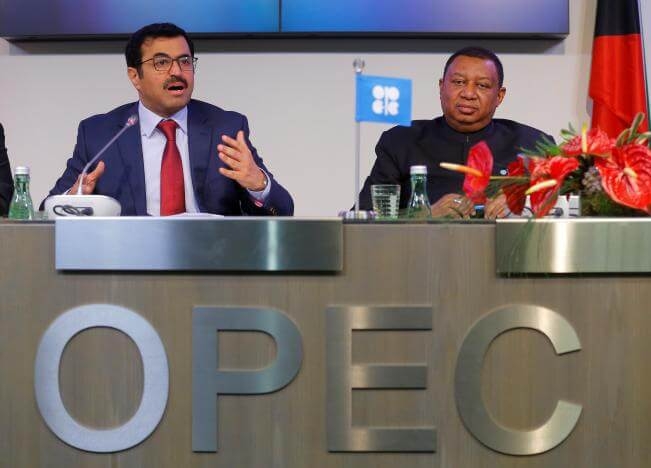 OPEC President Qatar’s Energy Minister Mohammed bin Saleh al-Sada and OPEC Secretary General Mohammad Barkindo[/caption]
OPEC President Qatar’s Energy Minister Mohammed bin Saleh al-Sada and OPEC Secretary General Mohammad Barkindo[/caption]
The Organisation of Petroleum Exporting Countries (OPEC) has agreed to cut its oil production output for the first time since 2008, after its member nations agreed to reduce production by around 4.5 percent.
According to the Association Press, the cartel will cut 1.2 million barrels a day from its present output after its 14 members put aside differences at a meeting Wednesday to agree on individual production levels.
The move, which will leave OPEC output at 32. 5 million barrels a day, is to take effect in January, said OPEC President Mohammed Bin Saleh Al-Sada.
Advertisement
Brent crude futures jumped 8 percent to more than $50 a barrel after OPEC announced the output deal. The move was the largest one-day gain since February.
The cuts include Ira reducing output by 200,000 bpd to 4.351 million bpd. The country had previously resisted cuts, providing a hurdle to an agreement.
Saudi Arabia, the biggest OPEC producer, would freeze output by 500,000 bpd to 10.06 million bpd, and other members would also cut production. Iran’s output level was trimmed only slightly to 3.797 million barrels a day from 3.975 million barrels.
Clashes between Saudi Arabia and Iran, whose struggle for dominance in the Middle East have dominated many previous OPEC meetings.
Advertisement
But the tone changed on Wednesday with Iranian Oil Minister Bijan Zanganeh saying he was positive since Iran had not been asked to cut output.
OPEC said it would exempt Iran, Libya and Nigeria from cuts as their output has been crimped by unrest and sanctions.
Al-Sada said Russia, a non-OPEC member, was prepared to cut output by 300,000 bpd, from its output of more than 10 million barrels a day.
OPEC will meet with non-OPEC producers on Dec. 9. The flood of supply from non-OPEC countries like the U.S. and Russia saw crude plunge from over $100 a barrel in June of 2014.
Oil fell to below $30 in January for the first time in over a decade, which caused recession in many oil-producing nations, including Russia, Brazil, and OPEC members Venezuela and Nigeria.
Advertisement
The price of crude, which had soared earlier in the day amid anticipation of a deal, remained firm after the news. The international benchmark was up $3.48, or 7.4 percent, at $49.86 a barrel.


